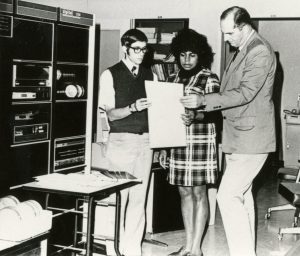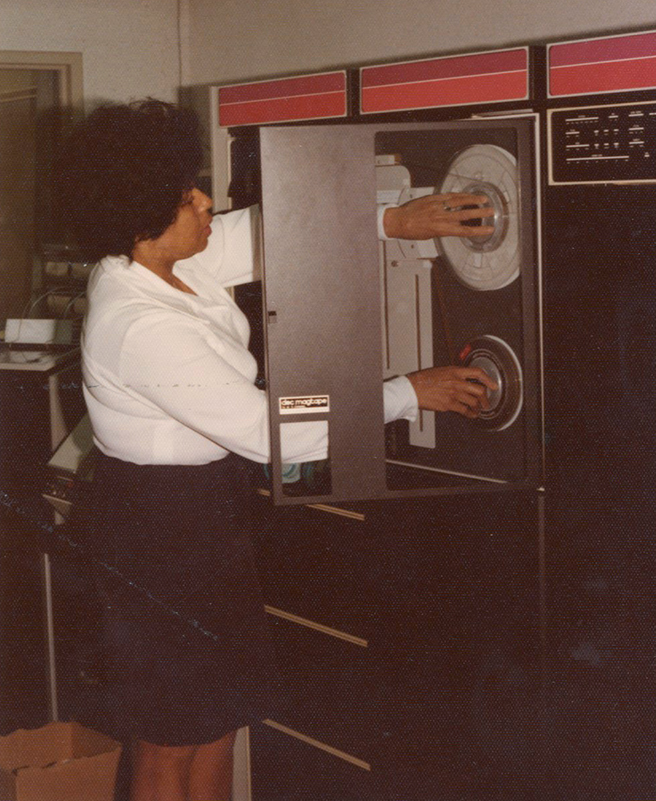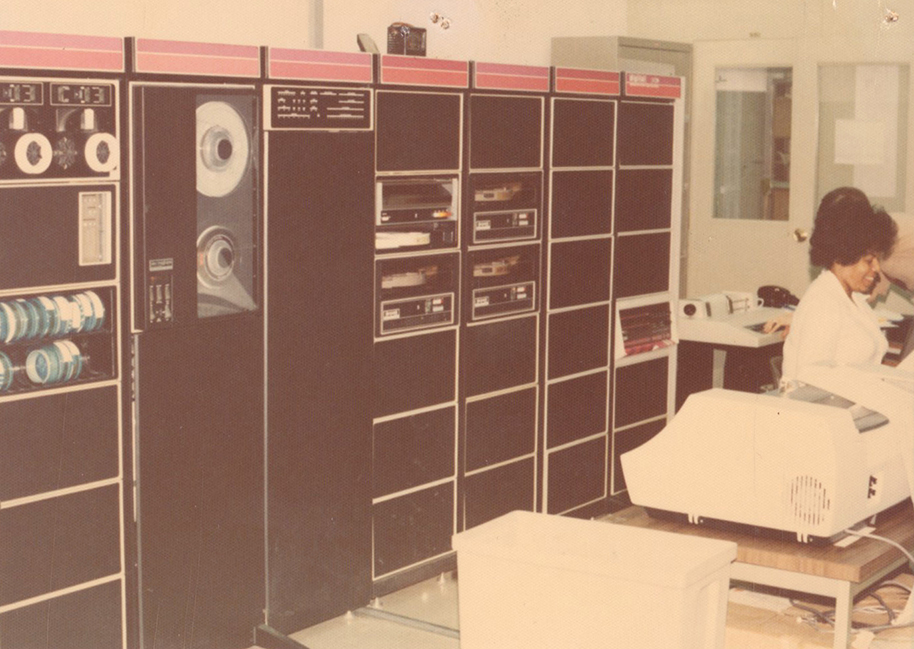
We received word here recently of the passing of Jasmine Robinson, a woman with a big smile and a bigger heart. Jim Amidon’s notice of her passing was an excellent piece of writing, summing up her life succinctly. I thought I might add to her story by sharing some Archives materials, including her words from the Black Oral History project of the 1980s. Thanks to Bill Doemel for reminding me of it!
It is always sad to hear of a member of the Wabash family passing. It so often feels to me like we have lost something big, a piece of our history has gone. This is especially true in the passing of Jasmine Robinson, who broke the professional color barrier at Wabash in the 1960s. Wabash had employed other Black women, but they were maids, janitors, or cooks at the fraternities. Jasmine was, however, the first woman of color to work in a professional role in all of Crawfordsville. When Paul Mielke hired her to work in the computer center here at Wabash in 1963, she was indeed the first woman of color to work professionally here.
At the top of the page I listed a few of Jasmine’s better-known accomplishments. I start with trailblazer, because for all her long life she was busy forging the way for those who would follow. It was in this line that she spoke to classes here at Wabash about what it was like to be on campus during the Civil Rights movement. To elaborate on her perspective, here are Jasmine’s own words from a transcript of a Black Oral History project undertaken in the early 1980s. The project looked at Wabash and the Black Experience and there was a second section which was Crawfordsville and the Black Experience. Jasmine, interestingly, could speak on both topics. She was interviewed by her friend Dr. Paul Mielke of the Mathematics Department in 1982. Here are some details of her life and quotes from the oral history project or Jasmine in her own words.
Jasmine was born on a farm in Putnam County just outside of Greencastle on May 8, 1927 as one of six children, she was the youngest. Living on a farm ensured that there was always enough to eat. When asked about life on the farm and discrimination she responded, “All of our neighbors were white, but we didn’t have any problems. We would go to their farm and help them and in return they would come to our farm and help us harvest. We looked at each other as just people.”
As a high school student, Jasmine was barred from the local drugstore where there was a soda fountain. Here is her description of that situation, “I noticed it [discrimination] when I entered high school because of the difference in skin color of my sister and myself. Then I was aware of it. She could go into the drugstore and site down and have a coke and I couldn’t because I was darker than she was.”
Jasmine came to Crawfordsville in October of 1947 after she married Andy Robinson, a local fellow. It took no time before the difference in society was made clear. “I remember distinctly that when we moved here there was a Welcome Wagon…I am afraid they did not welcome us.” In addition, it was very difficult to find housing as whites would not rent to people of color. They found one apartment with a Black landlord; however, no children were allowed. As the couple were expecting their first child, it was a short-term solution. They found other housing through their church with an unused second floor space in a family home. Their next home was Andy’s father’s house. When forced to move again, a white friend suggested that perhaps they could build their own home. They applied to a local savings and loan and were denied, despite their excellent credit and job stability. When their friend heard of this, he went to the bank and, “…and after some strong persuasion they gave us a loan (laughs) and we built this house that we are now living in, in 1964.”

When asked about the sorts of jobs available to her she replied, “I hate to say this, but overt discrimination in employment was a general practice here. Employment opportunities apart from domestic and janitors were few, if any.” Jasmine continued that there was, “an unwritten law,” that Black women, “…were to be maids and the men were to be janitors.” Her first job here in town was at a restaurant, peeling vegetables. She worked at a nursery school and earned money sewing, which continued to be her passion throughout life.
Paul asked her, “Did you ever feel treated as though you were not a person in these jobs?” She answered, “Some people respected me as a person and there were some who didn’t and in those instances I had to tune them out. I had to work, my husband’s paycheck was as small as mine…There were times when one would become depressed because you could not be yourself, you could not express what you felt with white people.”
Jasmine continued to seek out opportunities to better her employment and took a class at the Indiana Business School in Lafayette. In the meantime, she continued her quest for a better paying job and despite being turned down at more than one local manufacturer, she was hired at Hoosier Crown, a company that made bottle caps. Asked how she was treated there, “I was the first Black woman to be employed by industry. I am sure management accepted me and I would like to believe most of the employees did also.”

Jasmine met Paul Mielke at an NAACP meeting here in town, she was among the founders of the local chapter in 1959. Paul mentioned that there would shortly be an opening in the Computer Center at Wabash. Jasmine elaborated, “I don’t know if I ever told you, but I really didn’t believe you (laughs). After eight months of employment at Hoosier Crown, you did contact me and offered me a job in the computer center at Wabash College. I came to Wabash in October 1963.”
In another portion of the oral history, Mielke asked about her relationship with Black students, “I have tried to let them know that we are here, if there was a need that they could call on us. I tried to indicate that if there were dances, and the girls needed a place to stay, they could stay here.” There were dinners for all Black students at the Robinson home and so many conversations. Andy and Jasmine provided grounding and support.
Jasmine loved music, especially jazz and often wished for an outlet for that music. Not one to sit idly by, wishing for change, she made it happen with a show on the College radio station called Cooking With Jazz where she played her favorite jazz tunes. A catchy name, it was later used as the title of her legendary cookbook featuring many of her best dishes, along with those of others.
[Editor’s note: A copy is held here in the Archives, but there is also one available for checkout from the Lilly Library.]
Not only could Jasmine “spin the platters” she was also an accomplished musician who played the organ for her church and was the Musical Director there for over 45 years.
On the list of accomplishments must be her status as a championship bowler. Her love for bowling lasted a lifetime. She was a member of a group of Wabash women who competed on the national level. Jasmine kept bowling until she couldn’t but returned to the game in 2014 at the age of 87. Not surprising then that she was added to the local lanes’ Bowling Hall of Fame in 1988.
A loving wife to Andy and devoted mother to her two children, Jasmine was an inspiration to anyone who met her. Her dazzling smile, elegant style and unbounded enthusiasm for life were clear for all to see. At Homecoming in 2007, the National Association of Wabash Men honored Jasmine Robinson for her service to the College and its students by naming her an Honorary Alumna, the highest honor they can bestow. In addition, the computer center in the Malcolm X Institute is named for her, as a nod to her groundbreaking career and the MXI instituted the Jasmine Robinson Pioneering Woman Award.

In The Bachelor of March 24, 1988 Jasmine was the subject of a feature called “20 Questions: Jasmine Robinson” she was asked what was the best advice she ever received. Her answer was, “Never get too big to apologize.” Asked about her greatest ambition she answered, “I always wanted to be a counselor at a college or university.” Based on a lifetime of support, advocacy, and a loving outlook to so many young Wabash men, I would say that she surely achieved it.
Godspeed Jasmine Robinson.
All best,
Beth Swift
Archivist
Wabash College